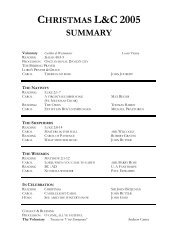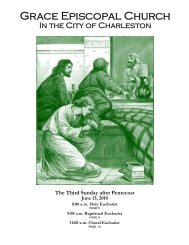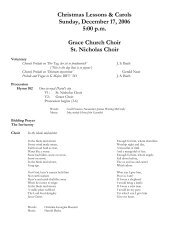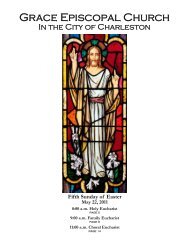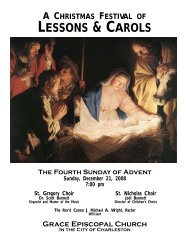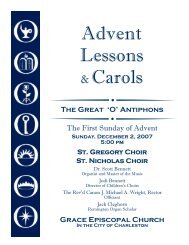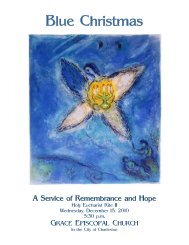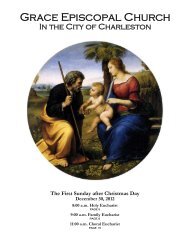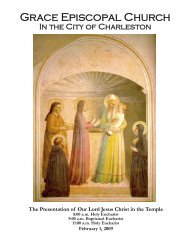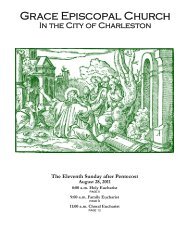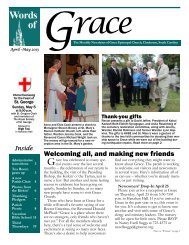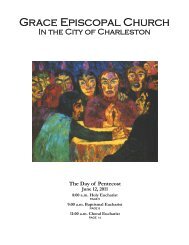Choral Evensong 4-22 - Grace Episcopal Church
Choral Evensong 4-22 - Grace Episcopal Church
Choral Evensong 4-22 - Grace Episcopal Church
You also want an ePaper? Increase the reach of your titles
YUMPU automatically turns print PDFs into web optimized ePapers that Google loves.
<strong>Choral</strong> <strong>Evensong</strong><br />
for the feast of<br />
St. George the Martyr<br />
(anticipated)<br />
Patron Saint of England<br />
With Special Prayers Offered in Remembrance of<br />
the Victims of the Virginia Tech Massacre on April 16, 2007<br />
<strong>Grace</strong> <strong>Episcopal</strong> <strong>Church</strong><br />
In the City of Charleston<br />
The Third Sunday of Easter<br />
April <strong>22</strong>, 2007<br />
The Reverend Canon J. Michael A. Wright, Officiant<br />
Dr. Scott Bennett, Organist and Master of the Music<br />
St. Gregory Choir<br />
Members of the Royal Society of St. George
Cover image: St. George and the Dragon by Paolo Uccello, 1458-60. Oil on canvas, Musée Jacquemart-André, Paris
St. George<br />
There are many legends in many cultures about St.<br />
George, but they all have a common theme; he must<br />
have been an outstanding character in his lifetime, for<br />
his reputation to have survived for almost 1,700 years.<br />
Most authorities agree that he was born in Cappadocia<br />
in what is now Turkey, around AD 280. It is probable<br />
that he was of Darian origin because of his tall stature<br />
and fair hair. He enlisted in the Cavalry of the Roman<br />
Army at 17, during the reign of the Emperor<br />
Diocletian, and established a reputation for his<br />
virtuous behavior and physical<br />
strength; his military bearing, valor and<br />
handsome good looks.<br />
He quickly achieved the rank of<br />
Millenary or Tribunus Militum,<br />
roughly equivalent to a full Colonel, in<br />
charge of a regiment of 1,000 men and<br />
became a favorite of his Emperor.<br />
Diocletian was a skilled military<br />
tactician and strict disciplinarian, who<br />
wanted to improve Rome’s morale by<br />
reviving its traditions and paganism.<br />
This was a time of high inflation and<br />
civil unrest in Rome, and one outcome<br />
of this was the increasing influence of Christianity.<br />
Diocletian achieved the reputation of being a cruel<br />
persecutor of Christians at that time.<br />
Having become a convert to Christianity, St. George<br />
acted to limit the excesses of Diocletian’s persecution.<br />
He entered the city of Nicomedia and tore down the<br />
notice of the Emperor’s edict calling for the burning of<br />
Christian churches and scripture. As news spread of<br />
his rebellion, St. George realized he faced arrest, and<br />
prepared by disposing of his property to the poor and<br />
freeing his slaves. It is said that he appeared before the<br />
emperor and denounced him eloquently, stirring the<br />
populace against the decree of persecution. The<br />
Emperor consigned St. George to prison with<br />
instructions that he be tortured until he denied his faith<br />
in Christ. Having defended his faith, he was beheaded<br />
at Nicomedia near Lyddia in Palestine on April 23, 303.<br />
Stories of St. George’s courage soon spread and his<br />
reputation grew very quickly. He soon became known<br />
in Russia and the Ukraine as the Trophy Bearer and his<br />
remains are said to have been buried in the church that<br />
bears his name in Lydda. However, his head was<br />
carried to Rome, where it was preserved in the <strong>Church</strong><br />
that is also dedicated to him. He was beatified by the<br />
Roman Catholic <strong>Church</strong> and is recognized in the<br />
liturgy of the Russian Orthodox and Greek Orthodox<br />
<strong>Church</strong>es as well as the Roman Catholic <strong>Church</strong>. He<br />
has been revered in the Ukraine since Christianity was<br />
established there in 988. His reputation for virtue and<br />
chivalrous conduct became the spiritual inspiration of<br />
the Crusaders, and pennants, flags and breastplates<br />
bearing a red cross on a white or silver background<br />
became prominent as a means of<br />
recognition by English Knights. The<br />
flag bearing St. George’s Cross was<br />
flown by English explorers to North<br />
America and by the Mayflower. It is<br />
also the flag of the <strong>Church</strong> of England.<br />
St. George became the Patron Saint of<br />
England in 1415, when English Soldiers<br />
under Henry V won the battle of<br />
Agincourt.<br />
Legends about St George spread far<br />
and wide. It was claimed that near the<br />
town of Silene in Libya, a dragon dwelt,<br />
keeping the population in terror. To satiate him the<br />
population offered tethered animals to consume until<br />
they had no more. They then provided human<br />
sacrifices and in ultimate desperation, a young princess<br />
was selected, the king’s daughter, Cleolinda. According<br />
to legend, St. George rode up on his white charger,<br />
dismounted and fought the monster on foot; until it<br />
eventually succumbed. He then dragged the dying<br />
monster into the city, using the girdle of the Princess,<br />
and slew the dragon in front of the people. The king<br />
offered St. George a bag of gold as a reward for saving<br />
his daughter, but St. George refused and asked that it<br />
be given to the poor.<br />
The story is a powerful allegory, emblematic of the<br />
triumph of good over evil; but it also teaches of<br />
enduring Christian faith in the extreme and the trust<br />
that at all times should be placed in the Almighty by<br />
the invocation of the name of St. George, Soldier,<br />
Saint and Martyr.<br />
(From the Royal Society of St. George’s website,<br />
royalsocietyofstgeorge.com)
What is <strong>Evensong</strong><br />
<strong>Evensong</strong> in <strong>Grace</strong> <strong>Church</strong> is a very tiny fragment of something else: it is a fragment<br />
of the worship which is offered to God by Christian people, every hour of the<br />
twenty-four, in every part of the world. When you come to <strong>Evensong</strong> at <strong>Grace</strong><br />
<strong>Church</strong>, it is as if you were dropping in on a conversation already in progress – a<br />
conversation between God and His people which began long before we were born,<br />
and will go on long after we are dead.<br />
<strong>Evensong</strong> is drawn almost entirely from the Bible. Its primary purpose is to proclaim<br />
the wonderful works of God in history and in the life, death and resurrection of Jesus<br />
Christ. Its secondary purpose is to evoke from the worshipper a response of<br />
praise, penitence, prayer and obedience.<br />
The service is in three parts. The first part (which is quite brief) prepares the worshipper<br />
for the story which is to follow. The second part is the narrative of God’s<br />
redeeming work, heard in the singing of psalms, canticles, and readings from Holy<br />
Scripture, which reaches its climax in the affirmation of faith (the Apostle’s Creed).<br />
The third part is our response to the God who has revealed Himself in history, in<br />
Jesus Christ, and in the <strong>Church</strong>.
<strong>Grace</strong> <strong>Episcopal</strong> <strong>Church</strong><br />
In the City of Charleston<br />
<strong>Choral</strong> Eucharist<br />
April <strong>22</strong>, 2007<br />
Welcome to <strong>Grace</strong> <strong>Church</strong>, celebrating our 161st year of service and worship in Charleston. Page numbers on the right side of this leaflet<br />
refer to the Book of Common Prayer. Hymn numbers are on the left side; numbers preceded by ‘S’ are from the Service Music at the<br />
front of the Hymnal.<br />
The Voluntary Adagio (Symphonie III) Louis Vierne<br />
Introit Hail, gladdening light! Charles Wood<br />
Hail, gladdening light, of His pure glory poured,<br />
Who is the Immortal Father, Heavenly, Blest,<br />
Holiest of Holies Jesus Christ, our Lord.<br />
Now we are come to the sun’s hour of rest,<br />
The lights of evening round us shine,<br />
We hymn the Father, Son, and Holy Spirit Divine.<br />
Worthiest art Thou at all times to be sung<br />
With undefiled tongue, Son of our God, giver of life alone;<br />
Therefore in all the world Thy glories Lord, they own.<br />
Please stand.<br />
518 Christ is made the sure foundation Westminster Abbey<br />
Please remain standing.<br />
The Lord’s Prayer (said together)<br />
The Invitatory and Psalter<br />
Preces<br />
Officiant: O Lord, open thou our lips.<br />
Choir: And our mouth shall show forth thy praise.<br />
Officiant: O God, make speed to save us.<br />
Choir: O Lord, make haste to help us.<br />
Officiant: Glory be to the Father, and to the Son, and to the Holy Ghost;<br />
Choir: As it was in the beginning, is now, and ever shall be: world without end. Amen.<br />
Officiant Praise ye the Lord.<br />
Choir: The Lord’s name be praised.<br />
Richard Shephard
Phos hilaron (choir) O gracious light David Hogan<br />
Please be seated.<br />
O gracious light, pure brightness of the everlasting One, O Jesus, Christ, most Holy<br />
and Blessed! Now as we come to the setting of the sun, and our eyes behold the<br />
vesper light, we sing thy praises, O God: Father, Son, and Holy Spirit. Thou art<br />
worthy at all times to be praised by happy voices, O Son of God, O Giver of Life,<br />
and to be glorified through all the worlds. Amen.<br />
Psalm 149 (Choir) Cantate Domino Charles Villiers Stanford<br />
O sing unto the Lord a new song *<br />
let the congregation of saints praise him.<br />
Let Israel rejoice in him that made him: *<br />
and let the children of Sion be joyful in their King.<br />
Let them praise his Name in the dance: *<br />
Let them sing praises unto him with timbrel and harp.<br />
For the Lord hath pleasure in his people, *<br />
and adorneth the humble with salvation.<br />
Let the saints be joyful with glory: *<br />
Let them sing for joy upon their couches.<br />
Let the praises of God be in their mouth, *<br />
and a two-edged sword in their hands;<br />
To be avenged of the nations, *<br />
And to rebuke the peoples;<br />
To bind their kings in chains, *<br />
and their nobles with links of iron;<br />
To execute upon them the judgment that is written. *<br />
Such honor have all his saints.<br />
The First Lesson: Revelation 19:11-21<br />
Then I saw heaven opened, and there was a white horse! Its rider is called Faithful and True, and in righteousness<br />
he judges and makes war. His eyes are like a flame of fire, and on his head are many diadems; and<br />
he has a name inscribed that no one knows but himself. He is clothed in a robe dipped in blood, and his<br />
name is called The Word of God. And the armies of heaven, wearing fine linen, white and pure, were following<br />
him on white horses. From his mouth comes a sharp sword with which to strike down the nations,<br />
and he will rule them with a rod of iron; he will tread the wine press of the fury of the wrath of God the Almighty.<br />
On his robe and on his thigh he has a name inscribed, “King of kings and Lord of lords.” Then I<br />
saw an angel standing in the sun, and with a loud voice he called to all the birds that fly in midheaven,<br />
“Come, gather for the great supper of God, to eat the flesh of kings, the flesh of captains, the flesh of the<br />
mighty, the flesh of horses and their riders—flesh of all, both free and slave, both small and great.” Then I<br />
saw the beast and the kings of the earth with their armies gathered to make war against the rider on the<br />
horse and against his army. And the beast was captured, and with it the false prophet who had performed in<br />
its presence the signs by which he deceived those who had received the mark of the beast and those who<br />
worshiped its image. These two were thrown alive into the lake of fire that burns with sulfur. And the rest<br />
were killed by the sword of the rider on the horse, the sword that came from his mouth; and all the birds
were gorged with their flesh.<br />
Please stand.<br />
The Office Hymn 410 Praise, my soul, the King of heaven Lauda anima<br />
Please be seated.<br />
Magnificat (choir) Magnificat in C, op. 115 Charles Villiers Stanford<br />
My soul doth magnify the Lord:<br />
and my spirit hath rejoiced in God my Saviour.<br />
For He hath regarded:<br />
the lowliness of His handmaiden.<br />
For behold, from henceforth:<br />
all generations shall call me blessed.<br />
For He that is mighty hath magnified me:<br />
and holy is His Name.<br />
And His mercy is on them that fear Him:<br />
throughout all generations.<br />
He hath shewed strength with His arm:<br />
He hath scattered the proud in the imagination of their hearts.<br />
He hath put down the mighty from their seat:<br />
and hath exalted the humble and meek.<br />
He hath filled the hungry with good things:<br />
and the rich He hath sent empty away.<br />
He rememb’ring His mercy hath holpen His servant Israel:<br />
as He promised to our forefathers, Abraham and his seed for ever.<br />
Glory be to the Father, and to the Son, and to the Holy Ghost;<br />
as it was in the beginning, is now, and ever shall be: world without end. Amen.<br />
(Luke 1:46-55)<br />
The Second Lesson: Ephesians 6:10-20<br />
Finally, be strong in the Lord and in the strength of his power. Put on the whole armor of God, so that you<br />
may be able to stand against the wiles of the devil. For our struggle is not against enemies of blood and<br />
flesh, but against the rulers, against the authorities, against the cosmic powers of this present darkness,<br />
against the spiritual forces of evil in the heavenly places. Therefore take up the whole armor of God, so that<br />
you may be able to withstand on that evil day, and having done everything, to stand firm. Stand therefore,<br />
and fasten the belt of truth around your waist, and put on the breastplate of righteousness. As shoes for<br />
your feet put on whatever will make you ready to proclaim the gospel of peace. With all of these, take the<br />
shield of faith, with which you will be able to quench all the flaming arrows of the evil one. Take the helmet<br />
of salvation, and the sword of the Spirit, which is the word of God. Pray in the Spirit at all times in every<br />
prayer and supplication. To that end keep alert and always persevere in supplication for all the saints. Pray<br />
also for me, so that when I speak, a message may be given to me to make known with boldness the mystery<br />
of the gospel, for which I am an ambassador in chains. Pray that I may declare it boldly, as I must speak.
(Offered in memory of those who were murdered at Virginia Tech on Monday, April 16, 2007)<br />
Nunc dimittis (choir) Nunc dimittis in C, op. 115 Charles Villiers Stanford<br />
Please stand.<br />
Lord now lettest thou thy servant depart in peace, according to thy word.<br />
For mine eyes have seen thy salvation,<br />
which thou hast prepared before the face of all people;<br />
to be a light to lighten the Gentiles, and to be the glory of thy people Israel.<br />
Glory be to the Father and to the Son, and to the Holy Ghost;<br />
as it was in the beginning, is now and ever shall be, world without end. Amen<br />
(Luke 2:29-32)<br />
The Apostles’ Creed (said)<br />
I believe in God, the Father almighty,<br />
maker of heaven and earth;<br />
And in Jesus Christ his only Son our Lord;<br />
who was conceived by the Holy Ghost,<br />
born of the Virgin Mary,<br />
suffered under Pontius Pilate,<br />
was crucified, dead, and buried.<br />
He descended into hell.<br />
The third day he rose again from the dead.<br />
He ascended into heaven,<br />
and sitteth on the right hand of God the Father almighty.<br />
From thence he shall come to judge the quick and the dead.<br />
I believe in the Holy Ghost,<br />
the holy catholic <strong>Church</strong>,<br />
the communion of saints,<br />
the forgiveness of sins,<br />
the resurrection of the body,<br />
and the life everlasting. Amen.<br />
The Prayers<br />
Richard Shephard<br />
Officiant: The Lord be with you.<br />
Choir: And with thy Spirit.<br />
Officiant: Let us pray.<br />
Please kneel.<br />
Choir: Lord, have mercy upon us. Christ, have mercy upon us. Lord, have mercy upon us.<br />
Officiant: Our Father,<br />
All: who art in heaven,<br />
hallowed be thy name.<br />
Thy kingdom come,<br />
thy will be done on<br />
earth as it is in heaven.<br />
Give us this day our daily bread,<br />
and forgive us our trespasses,<br />
as we forgive them that trespass against us.<br />
And lead us not into temptation,
ut deliver us from evil.<br />
Amen.<br />
The Suffrages (Choir)<br />
Officiant: O Lord, show thy mercy upon us.<br />
Choir: And grant us thy salvation.<br />
Officiant: O Lord, save the State.<br />
Choir: And mercifully hear us when we call upon thee.<br />
Officiant: Endue thy ministers with righteousness.<br />
Choir: And make thy chosen people joyful.<br />
Officiant: O Lord, save thy people,<br />
Choir: And bless thine inheritance.<br />
Officiant: Give peace in our time, O Lord,<br />
Choir: Because there is none other that fighteth for us, but only thou, O God.<br />
Officiant: O God, make clean our hearts within us.<br />
Choir: And take not thy Holy Spirit from us.<br />
A Collect for St. George the Martyr<br />
O God of hosts, who didst so kindle the flame of love in the heart of thy servant George that<br />
he bore witness to the risen Lord by his life and by his death: grant us the same faith and<br />
power of love that we, who rejoice in his triumphs, may come to share with him the fullness of<br />
the resurrection; through Jesus Christ our Lord. Amen.<br />
A Collect for Peace<br />
O God, from whom all holy desires, all good counsels, and all just works do proceed: Give<br />
unto thy servants that peace which the world cannot give, that our hearts may be set to obey<br />
thy commandments, and also that by thee, we, being defended from the fear of all enemies,<br />
may pass our time in rest and quietness; through the merits of Jesus Christ our Savior. Amen.<br />
A Collect for Aid against Perils<br />
Lighten our darkness, we beseech thee, O Lord; and by thy great mercy defend us from all perils<br />
and dangers of this night; for the love of thy only Son, our Savior Jesus Christ. Amen.<br />
Please be seated.<br />
The Anthem If we believe that Jesus died John Goss<br />
If we believe that Jesus died and rose again, even so them also which sleep in Jesus, will<br />
God bring with him. Wherefore comfort one another with these words.<br />
(I Thessalonians 4:14, 18)<br />
Closing Prayers in Remembrance of the Victims of the Virginia Tech Massacre<br />
Orison (choir) Christ be with you Barry Rose<br />
Christ be with you,<br />
Christ within you,<br />
Christ behind you,<br />
Christ beside you,<br />
Christ to win you,<br />
Christ to comfort and restore you.<br />
Christ beneath you,<br />
Christ above you, Christ in quiet,<br />
Christ in danger,
Blessing<br />
Christ in hearts of all who love you,<br />
Christ in mouth of friend and stranger.<br />
(Words attrib. St. Patrick, adapted.)<br />
Hymn 24 The day thou gavest St. Clement<br />
Final Response<br />
Officiant: The Lord be with you:<br />
Choir: And with thy spirit.<br />
Officiant: The Lord give us his peace:<br />
Choir: And life eternal. Amen.<br />
The Voluntary Postlude I Jean Langlais<br />
Ringing of the Tower Bells<br />
Chiltern Mid-Week Group<br />
Buckinghamshire, England<br />
Service Participants<br />
Officiant<br />
The Reverend Canon J. Michael A. Wright<br />
Prayers<br />
The Reverend Donald S. McPhail<br />
Lectors<br />
A. Donald Evans, Mara P. Brockbank<br />
Music<br />
Dr. Scott Bennett, Organist and Master of the Music<br />
The St. Gregory Choir
The Royal Society of St. George<br />
The story of England and the English is one of history’s most remarkable sagas. The word “England”<br />
conjures up many different images: from our great cities with their imposing Georgian and Victorian<br />
architecture to the Medieval castles and cathedrals of our country towns and the delightful villages and<br />
tranquil meadows of the rural shires, England’s green and pleasant land. It is, however, its distinctive<br />
culture, values and traditions which are the unmistakable marks of English nationhood.<br />
Even today, though some of the old glories and certainties may have dimmed, England still maintains<br />
her inner strength, her quiet dignity. No longer the hub of a great Empire, but still a bastion of<br />
freedom, gentility and human decency - values which give meaning to the clarion cry “Saint George for<br />
England!”<br />
Prior to the formation of The Royal Society of St. George and before the American War of<br />
Independence, Societies of St. George had been founded in the then North American Colonies for the<br />
relief of British immigrants and to give them general assistance in the new country. The earliest<br />
branches of which there are any records are those of New York (1770), Philadelphia (1772) and<br />
Charlestown (1773). Subsequently Branches were formed in all the great cities of the North American<br />
continent and celebrations were always held on St. George’s Day. At the time of the War of<br />
Independence many Loyalists moved to Canada and founded similar Societies there.<br />
The Royal Society of St. George was founded in 1894 with the noble object of promoting<br />
“Englishness” and the English way of life. The Society quickly attracted the support of many<br />
distinguished public figures in England and throughout the British Empire. Its first Royal Patron was<br />
Queen Victoria; and the society has enjoyed the Patronage of every reigning monarch from that day to<br />
this. Her Majesty Queen Elizabeth II, in 1963, bestowed a notable honour by granting the Society its<br />
own Royal Charter.<br />
Today, more than a century after its birth, the Society is still the standard bearer of traditional English<br />
values, both at home and abroad. Its role is primarily educational, promoting the common cultural<br />
heritage of people throughout the English-speaking world, including our former Dominions and<br />
Colonies. The Society now focuses its work on the younger generations of English and kindred people<br />
whose most valuable inheritance is our nation’s history and culture.<br />
The objects of the Carolinian Branch of the Royal Society of St. George are:<br />
• To foster the love of England and to strengthen England and the Commonwealth by<br />
spreading the knowledge of English history, traditions, and ideals;<br />
• To keep fresh the memory of those in all walks of life, who have served England or the<br />
Commonwealth in the past, to inspire leadership in the future;<br />
• To combat all activities to undermine the strength of England or the Commonwealth;<br />
• To further English interest everywhere;<br />
•To ensure that Saint George’s Day is properly celebrated and to provide a focal point where<br />
English men and women may gather together;<br />
• To raise funds for charitable purposes, including support of United States armed forces<br />
members injured in armed conflict and the families of those injured or killed in armed conflict;<br />
• To promote social intercourse amongst its members.
<strong>Grace</strong> <strong>Episcopal</strong> <strong>Church</strong><br />
98 Wentworth Street, Charleston, South Carolina 29401<br />
(843) 723-4575<br />
gracechurchcharleston.org




